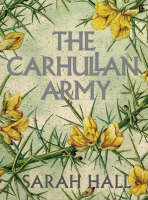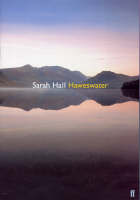Sarah Hall takes a 'cold eye' to her work
 Sarah Hall is a young writer with the uncanny ability to create both page turning reads and thoughtful poetic meditations. In this interview she discusses her new novel The Carhullan Army, the writing process, libraries and IRA training.
Sarah Hall is a young writer with the uncanny ability to create both page turning reads and thoughtful poetic meditations. In this interview she discusses her new novel The Carhullan Army, the writing process, libraries and IRA training.
On The Carhullan Army
I told Sarah that I had read the book really quickly and was quoting it to all and sundry. She said that was great as she was trying to create something page turning. Her previous books were slower and not so narrative based - more poetic meditations on historical events and characters. Carhullan was a bit of an exercise for her to see if she could write something speedy.
When she gave her Mum a proof copy and gave it back and said "it's a page turner" she knew she had achieved her goal.
On the physicalness of The Carhullan Army
The Carhullan Army involves a lot of physical military training, details of getting fitter and honing yourself. I asked Sarah how she managed to write about this so convincingly.
"Mum was a sports coach, and has always been outdoorsy - the Lake District is harsh territory and you have to be fairly durable."
Sarah has always seen a link between physical endurance and mental. The main character Sister toughens up mentally and physically.
What about the box scene and military training in Carhullan?
"Everyone talks about that scene. I have a friend who was in the US Military for a while and it is based on one of his training experiences so I changed it round a little bit. It either breaks people or it toughens them up."
Do you know when you're writing that people are going to fasten on a scene?
 "No it's always a surprise. Sometimes I'll be really worried about a scene but it turns out to be one people really like. In Haweswater there's a scene where Jack Liggett takes the dead eagle back up to the nest I was worried it was going to be a bit of a crappy scene, too sentimental, too symbolic or too something but people really like that scene. It's funny I don't think I've necessarily got my finger on the pulse of what people are going to think or what's going to affect them. And I think that scene in Carhullan affects people because it has that claustrophobic thing to it, it plays on a common fear … and torture is something that's on people's minds. Current wars that are going on … there is a lot of talk about torture and what constitutes it and what doesn't."
"No it's always a surprise. Sometimes I'll be really worried about a scene but it turns out to be one people really like. In Haweswater there's a scene where Jack Liggett takes the dead eagle back up to the nest I was worried it was going to be a bit of a crappy scene, too sentimental, too symbolic or too something but people really like that scene. It's funny I don't think I've necessarily got my finger on the pulse of what people are going to think or what's going to affect them. And I think that scene in Carhullan affects people because it has that claustrophobic thing to it, it plays on a common fear … and torture is something that's on people's minds. Current wars that are going on … there is a lot of talk about torture and what constitutes it and what doesn't."
"A lot of training in the book is based on IRA training - uplands/rural warfare/rebellion and paramilitary training based on the IRA document The Green book outlining how to resist torture and what to say if you're held captive."
We talked a bit about NZ's Urewera terrorist arrests last year and Sarah was interested to hear about the similar things happening here in NZ.
Sarah found it weird that while the book was its final stages of production there was a story in the UK of London bombers training in the Lake district. Her homeland has great significance for her: "The Lake District now is seen as wild and lovely but people realise it is harsh territory still. But it does have the connotations of the Romantic, of Wordsworth".
On libraries
"In my hometown there is quite a good library. I remember going to the library when I was very little because my Mum would go, she's a big reader and she'd go at least once a week. I was brought up in a very remote rural valley in the Lakes District and before Mum got her driving license we'd get the bus into town and there'd be the ritual of going to the library. I do like libraries, my partner is an enormous library pouncer and goes a couple of times a week so if I can't make it I can always give him a list".
Research/History and British Science Fiction
Sarah's previous books have focused on specific events and general period research, but even in Carhullan which is set in the future, the premise is like a lot of British science fiction - the worst happens you're kind of thrown back into the past. After a catastrophe, people revert to farming methods that are 200-300 years old.
Sarah observes that the character Jackie Nixon is indoctrinating them or giving rousing speeches - she turns over old phrases "these are disputed lands" (as the border lands are called which have provoked much Scots/English warfare).
"I like the sense of what the land has, what the land keeps historically, how people feel about it. Always over land."
I talked to Sarah about the 70s series The Survivors which focused on not just on a disaster, but how the survivors started using old methods to keep life going and so we started talking about sci fi.
"American sci fi is techy, the threat comes from aliens, it's a separate threat. British sci fi acknowledges very well that the problems we face are created by us and you end up having to face a problem that you've created yourself. Climate change would fall into that category. I do like a lot of those old British sci fi things like Day of the Triffids - you get all these weird happenings but at the same time very English, flat caps and a pint in the pub.There's always a sense of tradition."
Sarah's influences?
"I'm a lark, would love to be able to work at night but just can't - am equally influenced by film and music as by other writers. Maybe it's a generational thing."
She loves the writing of Cormac McCarthy - "not just his subject matter but the way he writes about land and how the language lends itself to those landscapes."
Music? My Morning Jacket, opera, folk music. "I came across it in the pubs, people having a sing song and old blokes singing".
What things are you working on at the moment and what do you have on the backburner?
"I'm working on the draft of a novel, finished it before I started Carhullan. I had a two book deal, publisher accepted it then started writing Carhullan and that was a quick book to write. We decided to release Carhullan first as it was topical and everything was going on at the minute. Now I've gone back to the old draft and am having to rewrite it - in a way it is good as I have a "cold eye" and can go in and take it apart and put it back together again. In a way it is hard reconnnecting with something that feels like it was written by a younger person."
"Carhullan has been a real learning curve as a writer it is much more pared down and it is third person and quite different even though it is dealing with some of the same themes and some of the same landscapes. So I would say the novel I am working on now is closer to "The Electric Michelangelo" in its level of description. So I'm going back in having learned some lessons from Carhullan."
Hew new novel is very loosely based around the life of Giorgio Morandi, Italian still life artist, "a very weird character who painted the same series of objects over and over again his whole life. A recluse, very well respected in the field of art but lot of rumours flew around about him and also speculation about the work. He painted bottles over and over again on the table and he never answered anyone's artistic theories about them. There is a character loosely based on him and four narratives. Art/Death/Existential matters. It's going to be a hard sell!"
"I've also got a series of short stories on the go (with no delivery date which is nice). I write them occasionally and then tuck them away."
Sarah also has a couple of ideas circulating for new novels as well. I asked her what she does with those ideas: "It's tempting to set to work on them, it can be exciting to start on something new rather than finish something. I'd like to write a pirate novel but I know I've got to get on with what I'm getting on with. I'll note something down … stew it over internally and see which one I'm interested in. When I signed up to a two book deal with Faber and Faber I had 10,000 words of a novel which didn't go anywhere and the idea for the second novel and then I proceeded to write two different novels completely which they accepted. Once you know you have to do something it becomes quite hard to do it."
Writers' festivals
"I like it. I usually breeze in and out, but it is nice to have time to stick around, great to meet other writers. My partner is a poet so I get to hear lots of poets reading and there's a lesson in how to present your work - go listen to a poet present their work. We're fascinated with writers, I'm a writer and I understand wanting to get to know them a bit and finding out what's behind the work. Even though I know better than that, I know that a novel is a piece of art and it's a separate thing as well. You can't read a writer too heavily into their work or it is a mistake too. There's a fascination with how someone just normal can create wonderful … I'd just die if I met Cormac McCarthy, I might melt into a puddle it'd be too much to process. At the same time I know he is a man So I love it, I love hearing writers read their work and talk about it."
"And it makes you think about your work in different ways, inevitably someone will ask you a really good question you've never really considered or a question that will bring something to mind for you. the whole thing is quite intuitive, you're not necessarily an expert in your own work or you haven't necessarily thought about things in an analytical way. It's quite good to do that, quite difficult as well."
Sarah Hall is involved in four festival sessions, a staple festival favourite “Books left on buses”,history and the novel, an opening night reading and finally an individual hour long audience.
- Our profile of Sarah
- Search the library catalogue for books by Sarah Hall
Donna Robertson interviewed Sarah Hall for Christchurch City Libraries at the Auckland Writers and Readers Festival, May 2008.

